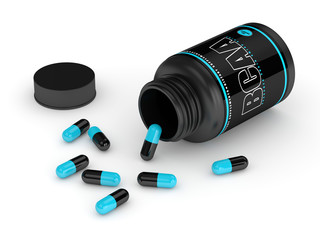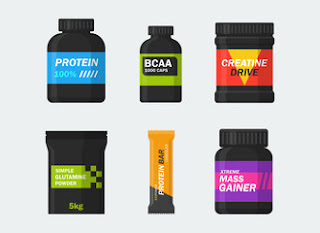Getting the perfect fit body is never easy.
Engaging in fitness routines can be challenging for some. Sometimes after training, the results are not forthcoming.
Many people have considered fitness supplements as the solution and have sought to know about them. What are fitness supplements? Are fitness supplements bad for you? In this article, I’ll be discussing briefly about fitness supplements and how they affect you. I’ll concisely explore the contents of these fitness supplements.
What are fitness supplements?
Fitness or bodybuilding supplements are dietary supplements that are taken, in order to enhance athletic performance, cause weight gain or weight loss or replace meals. There are also preworkout supplements taken before a workout routine. Bodybuilding supplements are marketed to recreational bodybuilders, weightlifters and athletes.
Here are two quick facts about workout supplements I will like to you to know before moving on.
• Did you know that the use if ‘fitness supplements’ dates back to ancient Greece? Yes, athletes back then were told consume meat, wine and other tonics to improve their strength and stamina.
• In 1994, Dietary Supplement
Health and Education Act (DSHEA) was signed into law in the USA. This act made it possible for manufacturers to approve the safety and use of their supplements. Hence, needing no approval from the Food and Drug Administration (FDA).
Types Of Fitness Supplements
There are so many types of workout supplements available. Each athlete might respond differently to each supplement.
1. Branched-Chain Amino Acids (BCAA)
These are one of the most popular bodybuilding supplements around. Branched-Chain Amino Acids are three of the 20 amino acids in the body. There are leucine, isoleucine, and valine. These amino acids play a vital role in protein synthesis, and metabolism. They help in muscle recovery and increase the uptake of nutrients and glucose to the muscles during workout. It is highly recommended during fasted training. Quite a few research has been done to show the effectiveness of BCAA.
READ: The Most Important Workout Safety Tips You Should Heed
2. Creatine
Creatine is also one of the most popularly used supplements globally. Creatine is a substance that is found in the body, and is also found in
food like meats, eggs, and dairy.
Numerous scientific studies have shown that creatine can
Increase glycogen storage, strength, energy and high-intensity muscle performance. It also improves cell mass volume. Creatine supplements is not advisable for patients with kidney disease.
3. Protein
Protein supplements are also sold to bodybuilders to aid their workout. Proteins increase protein synthesis, muscle growth and to improve muscle recovery.
They help you increase your effectiveness and efficiency, a good example is keto1, a fitness supplement that is made from pure BHB salts and a healthy dose of caffeine.
There are sold in many forms, like protein shakes, meal replacement products and protein powder- which is the most common one. There are three common types of protein powder used today.
– Whey protein: This constitutes all the essential amino acids, lactose and branched-chain amino acid. It is also very rich in the amino acid cysteine. They are easily digested and suppress appetite. It has been shown to aid muscle recovery and growth.
– Egg protein: It is made from eggs and is a is a lactose- and dairy-free protein.
– Soy protein: it is made from soybeans and mainly contains isoflavones.
– Others are: Hemp protein, Rice protein, pea protein etc.
4. Beta Alanine
Beta-alanine is an amino acid that is naturally found in the body. The very common preworkout supplement, is widely known for reducing the fatigue associated with workout. It does this by increasing amount of the
molecule carnosine that can be stored in the muscles. Additionally it helps improving in anaerobic workout
capacity.
5. Betaine
Betaine, or trimethylglycine, is a naturally occuring compound found in plants like beets, wheat bran and quinoa. It has been shown to improve body composition, protein synthesis, promoting muscle gain and fat losss.
Furthermore, it has been said to boost muscle endurance and increase strength.
There are so many other workout supplements available today, some are sold all together in one like Rich Piana 5 Nutrition.
Now here comes the big questions, fitness enthusiasts, bodybuilders, athletes all ask, are fitness supplements safe? Let’s find out the truth about that.
READ: 3 Easy Workout Routines That Aid In Complete WeighLoss
Are bodybuilding supplements bad for you?
Because of the varying opinions and controversies surrounding workout supplements, a lot of people have wondered if workout supplements are bad for them or if supplements are necessary for them. Well, first of all, it is best to consult a doctor before taking any form of supplements. So as to ascertain if you are at risk in any way.
Secondly, you can get all these supplement naturally by dieting. Sure, it might be expensive and hard but nothing beats natural. You’ll get better results in when you workout and diet together, so don’t necessarily need workout supplements.
To answer the question plainly, here goes;
Bodybuilding supplements are not bad for you, instead bad bodybuilding supplements are bad for you. There are a lot of poor, unhealthy supplements made and advertised with grandiose claims. In 2013, The US FDA reported that about 50,000 health problems occurred yearly due to bodybuilding supplements. This shouldn’t scare you though.
You can use workout supplements, just be very careful when choosing the right one. You can read this article by Mike Matthews of LegionAthletics. It will help determine very good bodybuilding supplements.
Thanks for reading, please drop your comments, questions if you have any and don’t forget to share.












